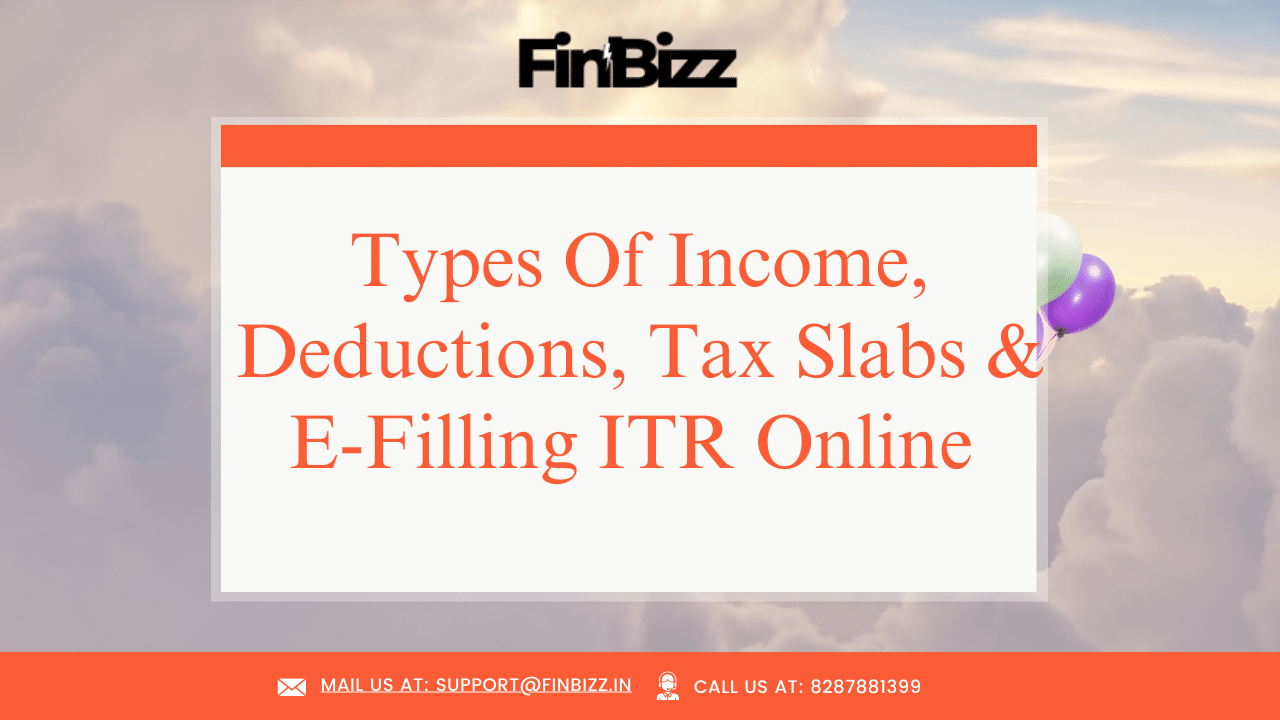Overview
Navigating the Indian income tax system requires a solid understanding of its fundamental principles. With FinBizz, you can ensure compliance with the law while optimizing your financial strategies. This guide provides detailed insights into different types of income, available deductions, the nuances of tax slabs, and the streamlined process of e-filing ITR online. Proper understanding can lead to significant savings and effective tax planning.

Types of Income
The Income Tax Act of India categorizes income into five distinct heads, each with its own set of rules and regulations. Here’s how FinBizz helps clarify these categories:
- Income from Salary: This encompasses all earnings from employment or services rendered, including but not limited to salaries, wages, pensions, allowances, and bonuses.
- Income from House Property: Includes earnings from a property that one owns. Potential deductions for this type of income include municipal taxes and standard deductions for repairs and maintenance.
- Profits and Gains from Business or Profession: This head includes income or losses associated with the operation of a business or profession and is calculated after deducting expenses incurred in the business operations.
- Capital Gains: Any profit from the sale of a capital asset falls under this category. Capital gains are classified as short-term or long-term based on the asset holding period and are taxed accordingly.
- Income from Other Sources: This includes income from sources like interest on savings, dividends, lottery winnings, and gifts. FinBizz provides guides on how to report these earnings and what deductions might apply.
Understanding Tax Deductions
Reducing taxable income through deductions is an effective way to manage tax liability. FinBizz educates on various deductions under the Income Tax Act, which include:
- Section 80C: Perhaps the most popular, this section allows deductions on investments up to ₹1.5 lakh annually in tax-saving instruments like ELSS, PPF, NSC, life insurance premiums, and tuition fees.
- Section 80D: Offers deductions for premiums paid on medical insurance. This can extend to cover premiums for parents and depend on their age.
- Section 80E: Deductions under this section are available for interest paid on educational loans, with no upper limit but qualifications for the type of education loan taken.
- Section 80G: Contributions to charitable organizations can also provide deductions, subject to certain conditions.
Utilizing these deductions can significantly lower your overall tax burden, and FinBizz can help identify which deductions best fit your financial scenario.

Overview of Tax Slabs
Understanding tax slabs is crucial for efficient tax planning. FinBizz provides clear, up-to-date information on the various tax slabs, which are determined by age and income level:
For individuals below 60 years old:
- Up to ₹2.5 lakh: No tax
- ₹2.5 lakh to ₹5 lakh: 5%
- ₹5 lakh to ₹10 lakh: 20%
- Above ₹10 lakh: 30%
For senior citizens (aged 60 years to less than 80 years):
- Up to ₹3 lakh: No tax
- ₹3 lakh to ₹5 lakh: 5%
- ₹5 lakh to ₹10 lakh: 20%
- Above ₹10 lakh: 30%
For super senior citizens (aged 80 years and above):
- Up to ₹5 lakh: No tax
- ₹5 lakh to ₹10 lakh: 20%
- Above ₹10 lakh: 30%
These slabs are designed to be progressive, taxing higher income at higher rates. FinBizz helps clients understand which slab they fall into and how best to plan their taxes accordingly.
Guide to e-Filing ITR Online
E-filing ITR online is a convenient and efficient way to comply with tax obligations. FinBizz simplifies this process through the following steps:
- Registration and Preparation: Register or log in on the official Income Tax e-Filing portal. Prepare by gathering all necessary documents related to income, deductions, and investments.
- Selecting the Right ITR Form: Depending on your sources of income, select the appropriate ITR form. FinBizz can help determine which form suits your economic activities.
- Filling Out the Form: Enter detailed information regarding all sources of income, claim applicable deductions, and detail tax payments already made.
- Verification: Once the form is submitted, it needs to be verified. This can be done electronically via Aadhaar OTP or through other electronic means provided by the portal.

Conclusion
With the expertise of FinBizz, mastering the complexities of income tax—ranging from different types of income, maximizing deductions, understanding tax slabs, and e-filing ITR online—becomes straightforward and efficient. This guide is designed to empower taxpayers with the knowledge to manage their taxes effectively.
FAQs
Q1: How can I maximize my tax savings with FinBizz?
Ans. FinBizz provides personalized tax planning services that consider your unique financial circumstances to identify optimal savings strategies.
Q2: Is there a way to track the status of my e-filed ITR?
Ans. Yes, the status of an e-filed ITR can be tracked on the Income Tax e-Filing portal. FinBizz can assist in monitoring this to ensure everything is processed smoothly.




